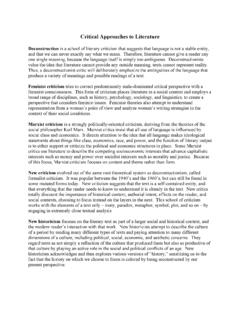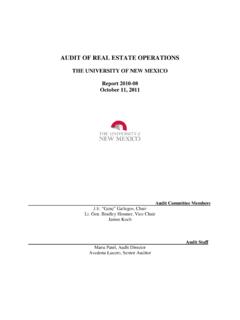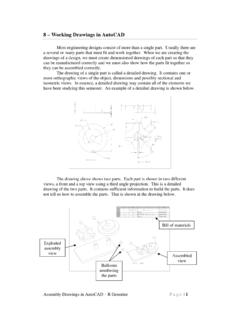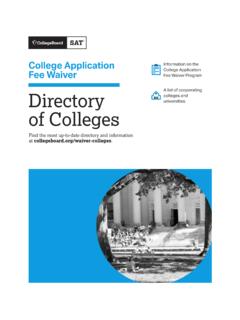Transcription of IMPACT OF ENTREPRENEURSHIP EDUCATION
1 Alberta CharneyGary D. LibecapIMPACT OF ENTREPRENEURSHIP EDUCATIONA KAUFFMANRESEARCH SERIESA lberta Charneyis a researcher in the Economic and Business ResearchProgram at the Eller college of Business and Public Administration. She hasbeen with the University of arizona since receiving her there. Heracademic publications cover a wide range of topics, including transportation,taxation, econometric model building, forecasting accuracy, input-ouputanalysis, water issues, migration and manufacturing location. She is a memberof the American Economics Association, the Regional Science Association andthe International Regional Science Association.
2 Gary D. Libecapis the Anheuser Busch Professor of ENTREPRENEURSHIP andDirector of the Karl Eller Center at the University of arizona . He is alsoResearch Associate at the National Bureau of Economic Research. He receivedhis in 1976 from the University of Pennsylvania. Libecap has served innumerous board and leadership positions, including the Economics Panel,National Science Foundation; Board of Directors, Western EconomicsAssociation; Board of Trustees, Economic History Association; and Co-Editor,Journal of Economic published, Libecap has received researchsupport from the National Science Foundation, World Bank, Earhart Foundation,Center for Energy and Mineral Resources, Seagrant and the Pacific Institute.
3 He has held faculty positions at the University of arizona , CalTech, USC, TexasA&M, University of New Mexico and the Free University of Berlin. He is also a member of the American Economics Association, Economic HistoryAssociation, Western Economics Association, Mont Pelerin and CliometricsSocieties, National Bureau of Economic Research, American Law and EconomicsAssociation, and International Society for the New Institutional Economics. The Kauffman Center for Entrepreneurial Leadership is the nation slargest organization focused solely on developing, supporting and encouragingentrepreneurship EDUCATION and research. The Center s nationally recognizedstaff works with high-growth entrepreneurs, government policy makers,entrepreneurial support organizations and leaders in entrepreneurshipeducation to develop and disseminate innovative, effective programs andinformational resources that enhance entrepreneurial skills and abilities at alllevels.
4 The Center is fully funded by the Ewing Marion Kauffman Foundationand was founded by Ewing Marion Kauffman, a successful entrepreneur whosevision and values led to the creation of a $1 billion pharmaceutical companyfrom a start-up operation in the basement of his home. For more information,visit the Center s web site at ResearchersAlberta Charney Gary D. Libecap The Kauffman Center forEntrepreneurial Leadership 8 Today, no matter where you turn,stories abound of the enormoussocial, economic and educational benefits of ENTREPRENEURSHIP . As aresult, ENTREPRENEURSHIP EDUCATION programs are proliferating incolleges and universities around the country.
5 Whereas 15 years agoonly a handful of schools offered courses in ENTREPRENEURSHIP , todaymore than 1,500 colleges and universities offer some form ofentrepreneurship training. There are currently more than 100 activeuniversity-based ENTREPRENEURSHIP centers in the and more than270 endowed positions in ENTREPRENEURSHIP , an increase of 120 percentin just the last five the growing number of new and expanding educationalprograms in this area, many schools have been slow to respond to the increasing student and community interest. The growing number of students shunning traditional employment opportunities to becomeentrepreneurs has caught some business school faculty andadministrators off guard.
6 Many are still questioning whetherentrepreneurship is worth the investment, whether entrepreneurshiptraining enhances their students abilities to compete in today s jobmarket, and whether their ENTREPRENEURSHIP students make strongerand more successful business 1999, Alberta Charney and Gary Libecap pondered these questionsas well. By all appearances, the Berger ENTREPRENEURSHIP Program atthe University of arizona was highly successful. But how had theProgram affected the ENTREPRENEURSHIP students it had graduated overthe years? Where were they now, what were they doing, and were theyfaring better than other business school graduates?
7 Charney andLibecap further wondered how the ENTREPRENEURSHIP program hadimpacted the University s Eller college of Business and PublicAdministration. What kind of return had the business school receivedfor its 16 years of investment in ENTREPRENEURSHIP EDUCATION ?This report shares the findings from Charney and Libecap s comparisonof University of arizona business school graduates who completedtheEntrepreneurshipEducation: Is theImpact as Impressiveas the Demand?1 ENTREPRENEURSHIP has becomeone of the most sought-afterareas of study among collegiatebusiness students. Graduates ofthese programs are not onlyincreasing in number, they arereshaping our understanding ofmarket, technology andmanagement leadership.
8 Benton realizing their own perceivedopportunities, they continue todefine the standard for businessinnovation and, by doing so,will forever alter the competitivelandscape for future enterprise. Michael Camp, Director of Research, Kauffman Center for Entrepreneurial LeadershipBerger ENTREPRENEURSHIP Program to other University of Arizonabusiness school graduates who were notinvolved in the BergerProgram. In short, the results of the investigation are you are a college deanseeking justification for the allocationof limited resources .. an alumnusconsidering a donation for universitydevelopment opportunities .. a professorredesigning your coursecurriculum.
9 Or a studentconsidering various majors and their prospectsfor your professional career, you will find the results impressive. The findings estimate thatthe Eller college of Business and PublicAdministration at the University of arizona received 34 percent moreoutside funding nearly $12 million due to the existence andactivities of the Berger ENTREPRENEURSHIP Program and its opportunity-oriented, practical approach to business EDUCATION . Surveys of deans,department heads and development officers at the University ofArizona also indicate that pedagogical innovations in entrepreneurshiphave significantly improved the curriculum in other business disciplines,including the MBA average, graduates of the Berger ENTREPRENEURSHIP Program werethree timesmore likely to be involved in the creation of a new businessventure than were their non- ENTREPRENEURSHIP business school for the personal characteristics of the graduates and variousenvironmental factors.
10 ENTREPRENEURSHIP EDUCATION increased theprobability of an individual being instrumentally involved in a newbusiness venture by 25 percent over non- ENTREPRENEURSHIP graduates(Figure 1). More specifically, ENTREPRENEURSHIP students were 11 percentmore likely than were non- ENTREPRENEURSHIP students to own their ownbusinesses after graduation (Figure 2).Key FindingsEntrepreneurshipeducation attractssubstantial private-sector produces self-sufficiententerprising EDUCATION increases the formation of new venturesFigure educationincreases the likelihood of self-employment2 ENTREPRENEURSHIP EDUCATION contributed to the growth of firms,especially smaller emerging firms.













